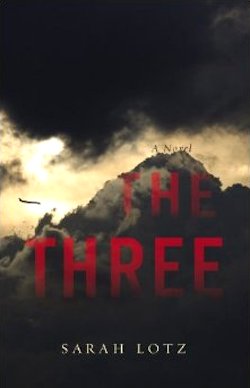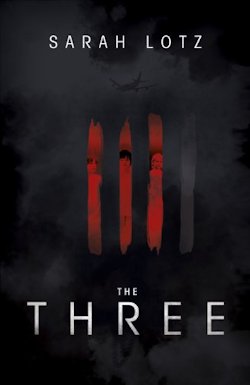Before the Frankfurt Book Fair a few years ago, a partial manuscript of The Three was sent to a selection of editors. A perfect storm of offers followed, and less than a day later, a substantial six figure sum from U.K. publisher Hodder & Stoughton coffers proved sufficient to secure the company Sarah Lotz’s phenomenal first novel. On the strength of an excerpt alone, this was practically unprecedented, especially for an author absent a track record to trade on.
But that, as a matter of fact, isn’t entirely accurate: though The Three is the first book to bear her name in such a prominent place outside of South Africa, Lotz has been around the block and back—in the publishing business, that is. In the past, she’s worked with her daughter Savannah on the Deadlands saga and she’s one of three writers behind Helena S. Paige’s pseudonymous Choose Your Own Erotica novels. The Three, however, has most in common with the scathing urban horror Lotz and Louis Greenberg collaborated on as S. L. Grey: not enjoyable novels, no—the events the Downside descents document being altogether too terrible to take pleasure from—but blerrie good books, to be sure. As, in its way, is Lotz’s latest.
A horror novel with a hell of a high-concept, The Three is a nightmarish indictment of contemporary culture in much the same way The Mall and The Ward were. Instead of demonstrating the darker side of capitalism or the health system, however, here, Lotz sets her sights on the religious right—in particular the way some folks use faith to advance their own agendas.
Authors and other artists are often advised against starting their sets with starring attractions; that it’s better, in most cases, to save their show-stoppers for later. This is just the first of a whole riot of rules The Three resists: its awful opening serves to set the scene straightaway for the non-traditional novel that follows.
Though her legacy looms large later on, we only know Pamela May Donald for a few brief moments. She’s a good wife, a good mother, and a good Christian woman; she’s also the only American on a connecting flight from Tokyo to Osaka, where she hopes to spend a few days with her daughter. As such, she’s a little fretful—afraid, as an infrequent flier, of the strange place which awaits.
She needn’t be. Pam, as it happens, doesn’t live long enough to land in Osaka. There’s a flash and a bang; some garbled warnings on the intercom; then the planes crashes—right into the heart of Aokigahara, Japan’s infamous suicide forest. In the immediate aftermath of the accident, Pam lives just long enough to leave a message on her cell phone: a personal message for her family and friends, and, pivotally, for her Pastor.
Ladies and gentlemen: Len Vorhees—no relation to Jason, though both are responsible for the deaths of many. Here, in any event, is how the Pastor’s perspective is positioned:
Even before Black Thursday, Len was one of those End Times believers. You know, those guys who saw signs that the tribulation was on us everywhere: 9/11, earthquakes, the Holocaust, globalisation, the War on Terror, all that. He truly believed it was only a matter of time before Jesus would whisk all the saved up into heaven, leaving the rest of the world behind to suffer under the Antichrist.
And so, of course, Pastor Len declares Pam a prophet, and interprets her last testament as a warning: that the horsemen of the apocalypse are among us; that they have taken the shape of innocents—in particular the children who miraculously survive the crashes.
That’s right—the crashes. See, Sun Air Flight 678 wasn’t the only plane to plummet out of the heavens on the day of Pam’s passing. Another aircraft crashed in the slums of South Africa; a third en route to England; and a final flight fell near North America. Unlikely, right? Tragic, too. Perfect fodder for perverse individuals with a thing for conspiracies:
Just a five-minute Google session will reveal several sites dedicated to the belief that Toshinori Seto, the brave, selfless captain who chose to bring down Sun Air Flight 678 in an unpopulated area rather than cause more casualties, was possessed by suicidal spirits. Another insists that all four planes were targeted by malevolent ETs. Crash investigators have pointed out in no uncertain terms that terrorist activity can be ruled out—especially in the case of the Dalu Air crash in Africa where the traffic controllers’ reports confirm that the disaster was due to pilot error—but there are anti-Islamic websites being created by the minute. And the religious nuts—it’s a sign from God!—are fast catching up with them.
Easy to forget, in the midst of all this madness, that thousands died that day. Only The Three—namely Bobby Small, Hiro Yanagida, and Jessica Craddock—escaped largely unharmed. This is their story.
That said, they don’t tell it. Instead, like a contemporary Carrie, Lotz’s novel—which reads as easily as anything Stephen King has written—is an epistolary presentation of interviews conducted via Skype and 2chan transcripts, alongside an assortment of blog posts, celebrity biographies and other ephemera, the bulk of which form a non-fiction narrative known as Black Thursday: From Crash to Conspiracy. Purportedly assembled by an investigative journalist called Elspeth Martins, this glimpse into what becomes, in short order, something of a phenomenon makes “no apologies for the inclusion of subject matter that some may find upsetting.”
Nor does the actual author. Nor should she. To be clear, The Three makes for deeply uneasy reading, and it is superficially critical of fundamentalist faith—I suppose I can see how it might anger some hardliners—but Lotz isn’t lampooning the Lord in this novel. Instead, she’s showing how belief can be—and has been—bastardised by people with proper problems; an absolutely valid narrative angle which paves the way for some truly dreadful deeds, detailed in scenes that will leave readers feeling like Bobby Small’s gobsmacked guardian:
I suppose what I was feeling right then was pure terror. Not the sort of terror you feel when you watch a horror movie or you get accosted by a homeless man with crazy eyes, but a feeling so intense you barely have control of your body—like you’re not really connected to it properly any more.
The Three is such an overwhelming success that it feels pretty petty to draw attention to its missteps, but the sheer diversity of the many perspectives the text presents does pose a problem. At best, readers are left with an incomplete picture of its participants, thus there’s no growing close to these characters. But inasmuch as a distance develops by dint of this decision, it also adds to our sense of the sprawl of it all—a useful impression in a narrative this ambitious.
In addition, I was somewhat deflated by the bloodbath in the last act; as regards that, though, I dare say your mileage may vary.
But I’m not going to tell you anything else. I urge you, instead, to read about the rest yourself. If The Three isn’t the year’s most chilling work of fiction, I don’t know what is. Assiduously ambiguous, brilliantly balanced, carefully controlled and in the final summation fantastically crafted, it makes sense that this is the first of Sarah Lotz’s solo novels to be published outside South Africa. The Three is easily the best thing she’s written, and she’s quite right to want to own it.
Available at:
B&N, iBooks, and GooglePlay
The Three is available now in the U.S. from Little, Brown and in the U.K. from Hodder & Stoughton.
Niall Alexander is an extra-curricular English teacher who reads and writes about all things weird and wonderful for The Speculative Scotsman, Strange Horizons, and Tor.com. He’s been known to tweet, twoo.











